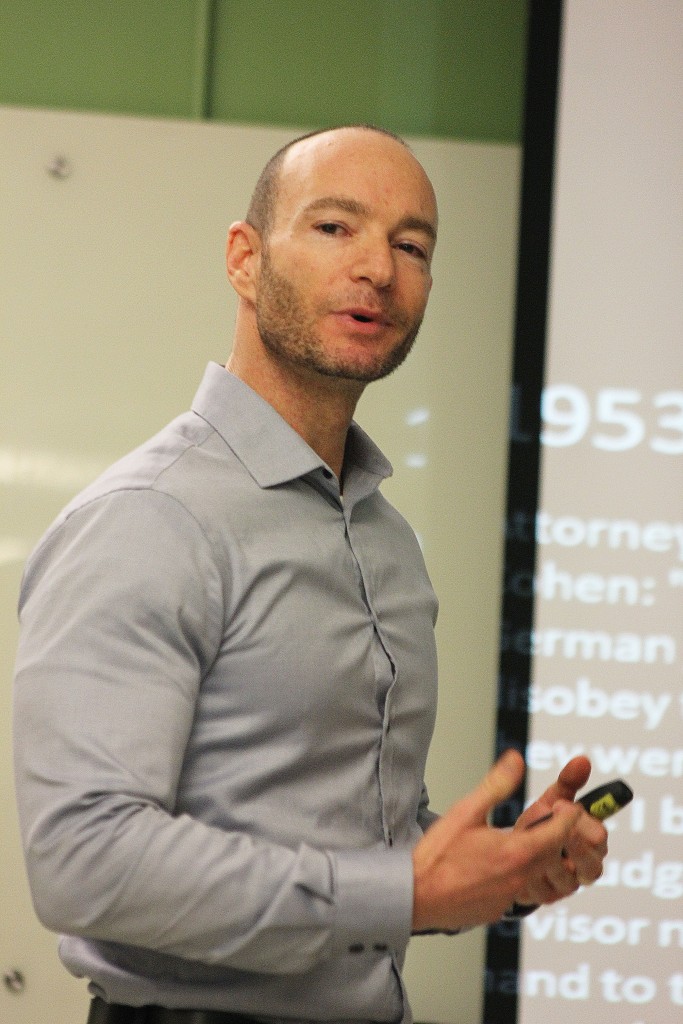
As an Israeli city councilman and LGBTQ rights activist, Etai Pinkas has a unique perspective of the LGBTQ movement in the Middle East. On Tuesday, he came to Binghamton University to share that perspective, discussing his involvement with the movement and its progression.
The event, which was co-hosted by Bearcats for Israel, Binghamton University Zionist Organization (BUZO), Stand With Us, SHADES and Keshet, was sponsored by the Hillel USA program to help spread Israeli awareness on college campuses.
Pinkas served as the chair of the National LGBT Association of Israel between 2000 to 2002, and was elected to Tel Aviv city council in 2003. At the event, he discussed his time as a city councilman, where he worked to further LGBTQ and environmental movements, but mainly focused on the recent court battles to change marriage and surrogacy laws in Israel.
He began with the history of Tel Aviv, discussing population growth and architectural progression in the city. He went on to examine how the LGBTQ movement started in the 1960s, before moving to his involvement in efforts for equal rights beginning in 2000.
According to Pinkas, he was one of the first people in Israel whose same-sex marriage was recognized by the country’s government, a legislative decision that happened 11 years ago. Now, he’s working toward efforts to legalize surrogacy for same-sex couples in Israel, because currently surrogacy is only an option for heterosexual couples.
Pinkas and his husband, Yoav Arad, were heard by the Israeli Supreme Court in 2010, and were denied the right for surrogacy. Pinkas’ second hearing will take place next week, six years after the first.
“It feels like pioneering — doing something for the first time, not giving up, not accepting the reality as it is, but believing you can change things,” Pinkas said.
After his speech, students asked about Pinkas’ background and experience as a member of the LGBTQ community in the Middle East. The questions ranged from Israeli relations with other Middle Eastern countries, to promoting awareness of the media’s tendency to ignore the nation’s progressive stance on LGBTQ issues.
“[The progress in the LGBTQ movement] is a true, authentic achievement of Israel’s,” Pinkas said. “There is no reason Israel wouldn’t show it to the world. It happened, and it happened in a relatively short amount of time and nobody did it for propaganda.”
Joshua Seed, the president of Bearcats for Israel and a senior double-majoring in geography and Judaic studies, said he enjoyed the speech’s perspective on Israel and its progression, and appreciated learning about the topic.
“Looking at [the nation] through the lens of LGBT rights, we’re seeing that [this is] a conversation that’s happening and that it’s a democratic process,” Seed said. “Though Israel struggles with its religious identity as a Jewish state and what that means, there’s a democratic process to make sure that these issues aren’t forgotten.”
On this trip across America through Hillel USA, Pinkas has already visited Ohio State University, Trinity College and Ithaca College in order to promote LGBTQ activism within student bodies.
“I think consistency is necessary for a change,” Pinkas said. “If people believe something in their reality is wrong, they can act about it. They have to consider that it can take time and it won’t necessarily easily happen, but it’s doable…people should have the courage to make their lives better wherever or whenever they can.”


